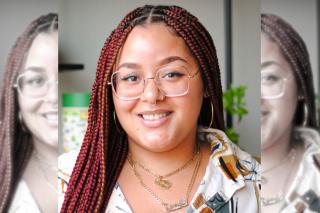Anna Rodriguez is a mental health therapist at Cartwheel Care, a behavioral healthcare company that partners with K-12 schools to provide mental health services to children and adolescents. Fluent in both Spanish and English, Anna conducts virtual therapy sessions, managing a caseload of 30 students referred to Cartwheel by school counselors. She supports students dealing with depression, anxiety, and PTSD. Among her clients are survivors of sexual assault and newly arrived immigrant families adjusting to life in the U.S.
In addition to conducting weekly therapy sessions, Anna is responsible for intake assessment and diagnosis and treatment planning. “We work with students on goals they can meet in short-term therapy,” says Anna, who sees her clients over 12 to 24 weeks. She also provides parents and guardians with resources, as well as referrals for longer-term or more specialized care.
On choosing Simmons
Anna graduated from Tufts University in 2018, earning a degree in Community Health and Education. After gaining experience in higher education, she decided to transition to a career as a therapist. She knew several mentors who graduated from Simmons Social Work. She recognized that a program with a robust clinical focus would best prepare her for her new path. “My goal was to work on the micro level,” she explains.
How Simmons prepared her
Completing her MSW deepened her understanding of the systems and environments that influence individuals’ lives. “It equipped me to see people as products of where we come from, particularly adults as the older version of their child self,” she says. During her first internship, Anna worked at St. Stephen’s Youth Programs, a multiservice organization in Boston’s South End providing academic and social-emotional support and enrichment programs for students in grades K2-8. She developed and facilitated social-emotional support workshops, conducted weekly wellness check-ins, mediated youth conflicts, and assisted in staff training initiatives. For her second placement, she interned in the Pediatric Behavioral Health Clinic at the Dimock Center in Roxbury. Here, she honed her skills in implementing a strengths-based, trauma-informed approach to care and in conducting bilingual individual therapy in a virtual setting. This experience, she says, “prepared me extremely well for my current position.”
Why the work is meaningful
“It’s important to me that marginalized youth know that their mental health is important and there are people in the field who understand their experiences with intersecting identities,” says Anna. “I feel honored to hold space for difficult situations and conversations while remaining humble. I’m here to guide youth to where they’re already going and to offer that extra support they might need to get there.”

